Sep 7, 2021
Some 70 Bolt food delivery drivers in Ukraine are waging a digital strike after their wages were reduced by 50 percent, a move that built on the drivers’ discontent with lack of health coverage and cutbacks in bonus payments, a growing global phenomenon. The platform workers are turning off their apps each day at 2 p.m., making it difficult for the company to fulfill evening food orders.
“Transportation costs are the same, risks are the same, and money is half as much. It’s outrageous!” says Artem, a Bolt courier. Like many striking couriers, his backpack features a sticker supporting the strike.
Further cutting into drivers’ wages, he says, is the need to pay for constant bike or scooter repairs.
“For seven days of eight to ten hours of work, a courier covers more than 1,000 kilometers (622 miles) amid city traffic. Every day, you face potholes on the road, there is a constant need of repair, replacing some parts,” he says. “Income no longer covers risks.”
Bolt Founder a Billionaire, Workers Struggle for Pay
Although Bolt is a familiar brand in the United States for its green ride-sharing scooters scattered across urban areas, elsewhere in the world, the company rivals Uber as a delivery service, with 75 million customers in Africa and Europe, especially eastern Europe. In Ukraine, Bolt has 3.5 million customers served by fewer than 100 delivery drivers.
The company is valued at more than $2 billion, according to its Estonian founder Markus Willig, and raised $20 million in funding from the World Bank’s International Finance Corporation this year. With total fundraising at $596 million, the company seeks to expand further into Africa and plans to add markets in Latin America and Asia Pacific through franchising agreements.
Yet, even as Willig, 27, has become the third richest person in Estonia through Bolt profits, couriers who daily face dangerous conditions receive no income when they are injured and cannot work.
“You constantly hear about couriers getting into an accident, receiving medical treatment, having surgery,” says Artem. “If you suffer yourself, there must be a certain ‘cushion’ for you not to starve at least for the duration of treatment.”
Bolt workers in Ukraine are calling for a return to the previous bonus and payment structure, and pay for waiting at restaurants for orders. They also want health and life insurance and say the company should seek legislative measures to ensure scooters are registered.
Platform Workers Join Together to Demand Rights
Well before the COVID-19 pandemic boosted home delivery services, the demand for couriers and other essential workers was increasing around the world. But because they are classified as “independent contractors,” platform workers are ineligible for the same benefits as workers in the formal economy, and typically are not covered by a country’s labor laws.
Like Bolt workers in Ukraine, couriers from Nigeria to Colombia are joining together to demand their fundamental rights to decent work—living wages, social protections like health care, and measures to improve job safety.
Workers at Bolt’s Ukraine rival, the Spanish-owned Glovo, pushed for an increase in wages and paid insurance, revealing brutal working conditions in the process. Across Ukraine, unions are engaged in creative campaigns to reach gig economy workers, a campaign worker rights attorney George Sandul discusses in depth on The Solidarity Center Podcast.
In Colombia, Rappi platform delivery workers last year formed the Union of Platform Workers (UNIDAPP), to counter fluctuating pay rates for individual delivery jobs, unexplained fines levied by the company, and the arbitrary barring of workers from the platform to accept jobs.
Bolt workers in other countries are taking action as well. Earlier this year, the Independent Workers’ Union of Great Britain protested lack of safety for drivers following the murder of Bolt driver Gabriel Bringye. Research published by Oxford University in March found that Bolt and Amazon had the worst working conditions for gig economy workers in the UK.
In Tbilisi, Georgia, couriers at Bolt went on strike in March to protest lowered wages and what they say is a manipulated bonus system and unwarranted layoffs. Georgia couriers at Glovo also protested this past spring over lack of medical coverage for work-related injuries and changes to the app-based algorithm making it more difficult to get orders..
Bolt drivers in Lagos, Nigeria, part of the Professional E-hailing Drivers and Private Owners Association, went on strike in April to protest poor working conditions and pay. Bolt recently was forced to increase fares in Kenya after drivers in Nairobi threatened to strike over high fuel prices.
As Artem says, “We have to remind them that in a food delivery company, couriers are the ones who actually deliver, and without them the company does not exist.”
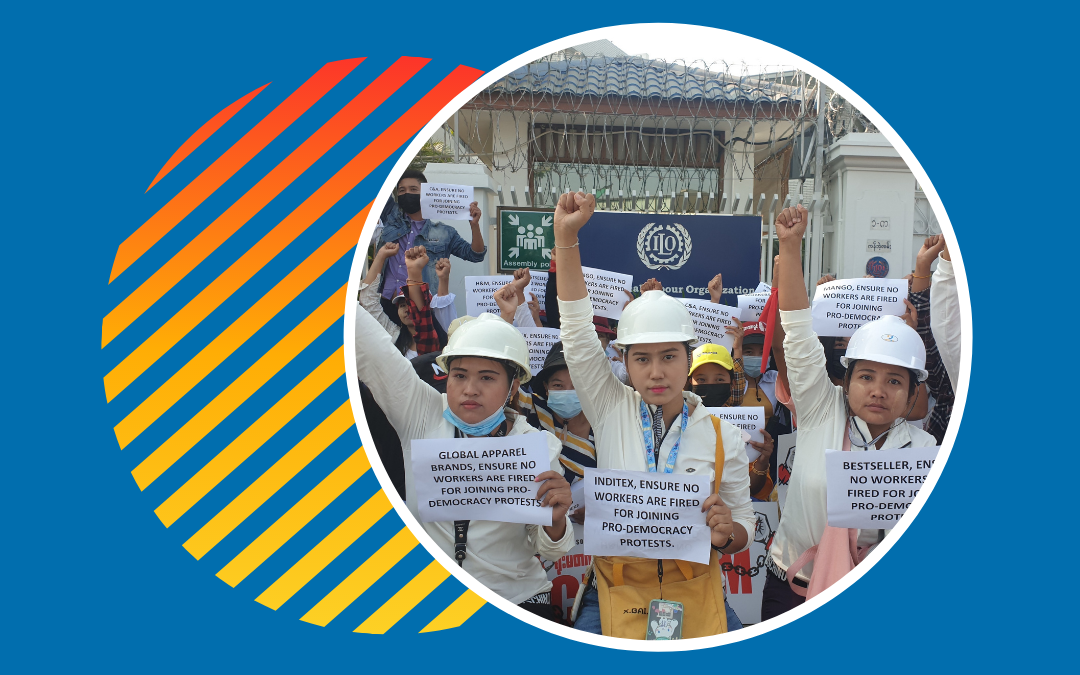
Jul 14, 2021
After the military overthrew Myanmar’s democratically elected government in February, the country’s garment workers, most of them young women, were the first to stand up to defend their right to a free and peaceful society. Since then, workers have led peaceful protests for a return to democracy—often met with violent repression, evictions, arrest warrants and prison.
Nearly 1,000 people have been killed and at least 5,000 arrested, most tortured in prison, forcing many workers and union leaders to flee. Because of their important role in standing for democracy, the government banned unions.
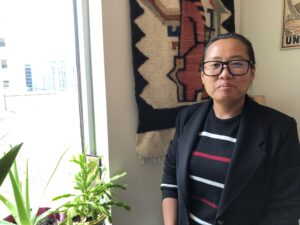
CTUM Assistant General Secretary Phyo Sandar Soe is standing with workers across Myanmar in a peaceful struggle for democracy. Credit: Solidarity Center/Tula Connell
In a special Solidarity Center summer podcast episode, host Shawna Bader-Blau, Solidarity Center executive director, talks with Phyo Sandar Soe, assistant general secretary of the Confederation of Trade Unions-Myanmar.
Speaking from a safe house, Sandar, a former garment worker, tells Bader-Blau that as multinationals begin to reopen in Myanmar, workers have no rights on the job without unions—including to be paid. The international community can truly help workers fighting for their rights by staying out of the country, she says. (Listen to the full interview.)
“If you invest in Myanmar, your investment money will go to the military regime,” Sandar says. “And then the military regime, with your money, they will keep controlling the country and they will buy guns and weapons, and then they will kill us.”
Like many union leaders, Sandar has her passport revoked to prevent them from leaving the country while they are being hunted by the regime. Despite the repression and personal danger, Sandar says when workers join together, they are strong.
“We are facing a bloody crackdown, but all people protect each other. We are finding solutions to fight back. That’s why I want to tell our brothers and sisters to endure this duration because we have very high motivation to fight back against the junta.”
Support Workers in Myanmar!
• Donate to a fund set up by the U.S.-based Asian Pacific American Labor Alliance. Your donation will go to those who have lost jobs and are struggling to survive because they stood up for a peaceful return to democracy. The link is available in the podcast notes for this episode.
• The International Trade Union Confederation is sponsoring a strike fund for workers in Myanmar.
Download Season One Episodes
The Solidarity Center Podcast, “Billions of Us, One Just Future,” highlights conversations with workers (and other smart people) worldwide shaping the workplace for the better.
Check out the full first season of The Solidarity Center Podcast and stay tuned for season two this fall!
This podcast was made possible by the Ford Foundation and the generous support of the American people through the U.S. Agency for International Development (USAID) under Cooperative Agreement No.AID-OAA-L-16-00001 and the opinions expressed herein are those of the participant(s) and do not necessarily reflect the views of USAID/USG.
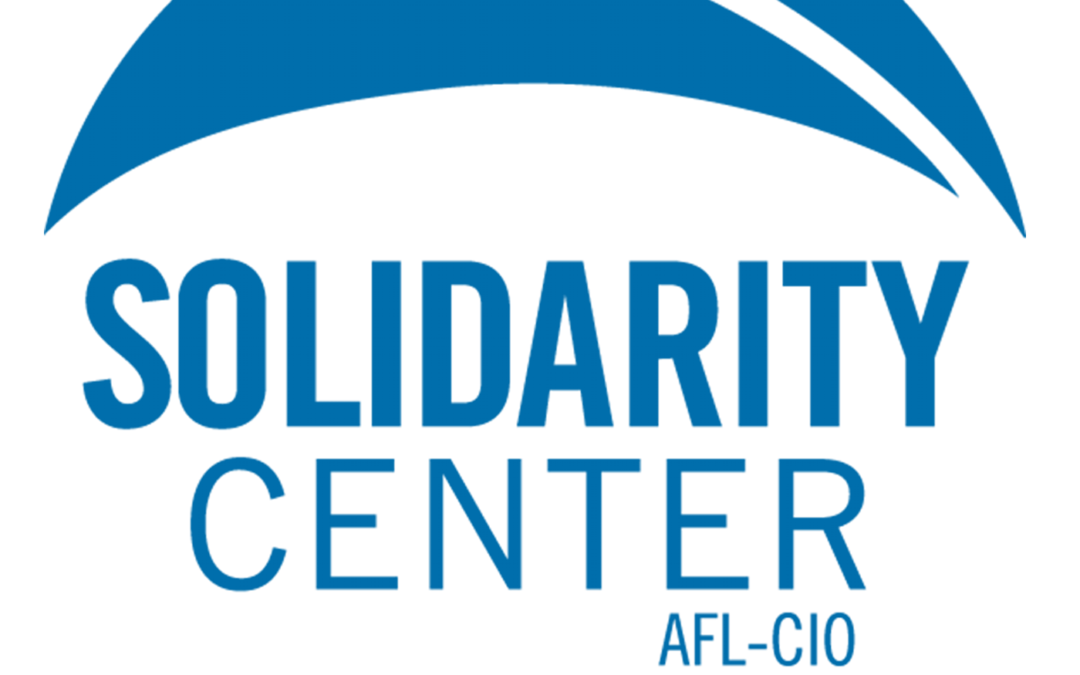
May 5, 2021
The Solidarity Center is honored to announce that two dynamic leaders from within the U.S. labor movement have joined its Board of Trustees.
The new members are Gabrielle Carteris, president of the Screen Actors Guild-American Federation of Television and Radio Artists (SAG-AFTRA) and Alvina Yeh, Executive Director of the Asian Pacific American Labor Alliance (APALA). They will join current Board of Trustees members guiding the Solidarity Center as it strives to empower workers to raise their voice for dignity on the job, justice in their communities and greater equality in the global economy.

SAG-AFTRA President Gabrielle Carteris. Credit: SAG-AFTRA
Gabrielle Carteris became SAG-AFTRA president in 2016, after serving two terms as executive vice president. She became a household name playing Andrea Zuckerman on Beverly Hills, 90210 and recently starred in BH90210, a revival of the iconic show. Her extensive resume includes work in television, film and the stage, with recent credits including a recurring role on Code Black and guest-starring roles on Criminal Minds, Make It or Break It, The Event, Longmire and The Middle. As a producer, Carteris created Lifestories, a series of specials, and Gabrielle, a talk show that she also hosted. In her role as SAG-AFTRA president, Carteris chairs the National TV/Theatrical Contracts Negotiating Committee and leads the President’s Task Force on Education, Outreach and Engagement. She represents SAG-AFTRA with the International Federation of Actors (FIA), where she works to bring actors together across borders.

APALA Executive Director Alvina Yeh. Credit: APALA
APALA Executive Director Alvina Yeh. Credit: APALAAlvina Yeh serves as the Executive Director of the Asian Pacific American Labor Alliance (APALA) and Institute for Asian Pacific American Leadership & Advancement (IAPALA). Originally from Colorado, she comes from a Chinese family who fled from the war in Vietnam. Alvina, a lifelong community organizer with experience in electoral and issue-based campaigns, has a career committed to social justice. She is deeply passionate about building a movement where everyone has a fair shot in a thriving society, and brings an international lens on human and worker rights to the work of APALA. Yeh currently serves as the Co-Chair of the National Council of Asian Pacific Americans (NCAPA) and serves the Congressional Progressive Caucus Center Advisory Board and the National Korean American Service & Education Consortium Action Fund (NAKASEC AF) Board.
“I am thrilled that President Carteris and Executive Director Yeh are joining our Board,” said Richard L. Trumka, president of the AFL-CIO and chair of the Solidarity Center Board of Trustees. “They bring important and diverse points of view and a deep commitment to the Solidarity Center’s mission to support worker rights around the world, for everyone. We look forward to their contributions.”
Shawna Bader-Blau, executive director of the Solidarity Center said: “The Solidarity Center is dedicated to building cross-movement relationships and strengthening the connections between workers in the United States and workers around the world. So we are excited to begin work with these two labor leaders who bring a passionate interest in worker rights, additional connections to the U.S. labor movement and a wealth of experience in organizing, international solidarity and power building for workers in the United States and beyond.”
The Solidarity Center is the largest U.S.-based international worker rights organization helping workers attain safe and healthy workplaces, family-supporting wages, dignity on the job, widespread democracy and greater equity at work and in their community. Allied with the AFL-CIO, the Solidarity Center assists workers across the globe as, together, they fight discrimination, exploitation and the systems that entrench poverty—to achieve shared prosperity in the global economy.
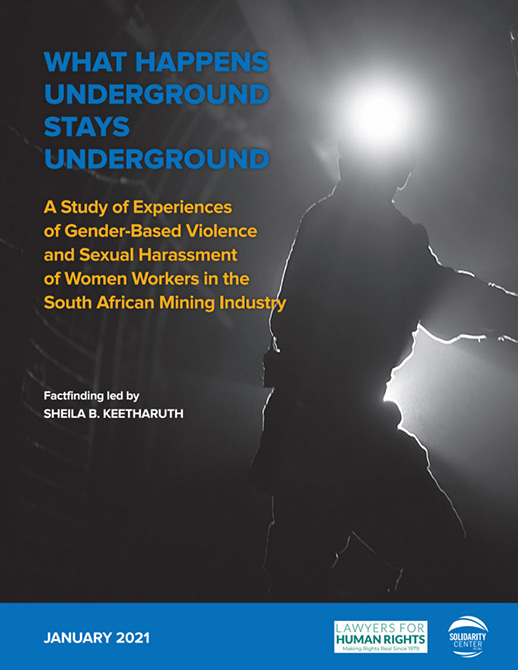
Apr 28, 2021
Women working in South Africa’s mining sector report being subject to sexual and gender-based violence and harassment, inside mines and within the mining communities where they live and efforts to redress such abuse must address the nature of the workplace and political, social and economic factors.
Download here.
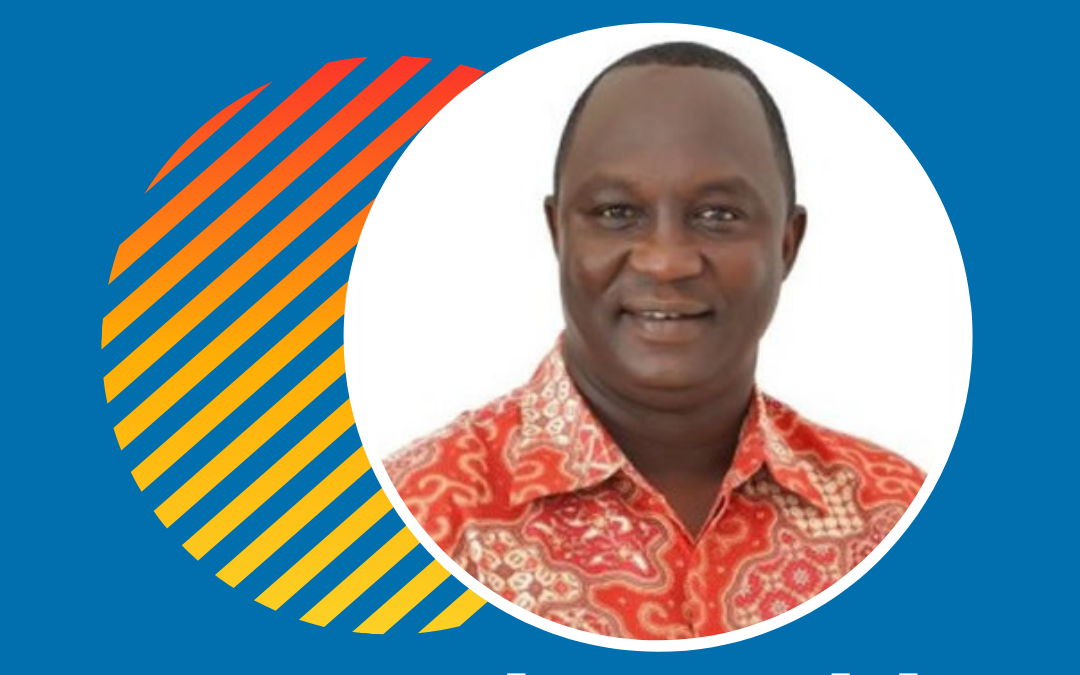
Apr 21, 2021
When the Nigerian government sought to raise taxes on basic goods and decrease subsidies on key items like fuel as millions of workers struggled without jobs or wages during the COVID-19 pandemic, the 4 million members of the Nigerian Labor Congress (NLC) successfully stood up against these assaults. NLC President Ayuba Wabba says the union first tried negotiating with the government. When that effort did not work, workers were set to strike, he said on the latest episode of The Solidarity Center Podcast.
“Many Nigerians are in very difficult situations right now because of the challenge of COVID-19. Most of their income have been disrupted and their survival is so difficult. So that is why we have to respond, to actually draw the attention of government. And such an approach is very, very necessary. We thought that governance should be about the interest of justice,” Wabba told podcast host and Solidarity Center Executive Director Shawna Bader-Blau.
A New Social Contract
In a wide-ranging conversation, Wabba, who is president of the International Trade Union Confederation (ITUC), describes efforts at the global level to build a post-COVID world where all workers are covered by social protections such as paid sick leave, access to protective safety equipment, health care and good wages.
“COVID-19 has exposed the inadequacies in the entire social protection system,” he says. “We are also trying to make sure that COVID-19 is one of the diseases that is also covered by occupational health and safety for all workers, including casual workers, including migrant workers, including workers working in the precarious sector because this is very important. If not, the inequality gap between the rich and the poor will continue to be widened.”
As a global union leader, Wabba is at the forefront of the international campaign to ensure the future of work ensures good jobs as well as green jobs to address the ongoing challenges of climate change. “You don’t need to contaminate the environment for you to be able to retain jobs. Jobs can be produced using greener forms of energy.”
Download Season One Episodes
The Solidarity Center Podcast, “Billions of Us, One Just Future,” highlights conversations with workers (and other smart people) worldwide shaping the workplace for the better.
Check out the full first season of The Solidarity Center Podcast and stay tuned for season two this fall!
This podcast was made possible by the generous support of the American people through the U.S. Agency for International Development (USAID) under Cooperative Agreement No.AID-OAA-L-16-00001 and the opinions expressed herein are those of the participant(s) and do not necessarily reflect the views of USAID/USG.







